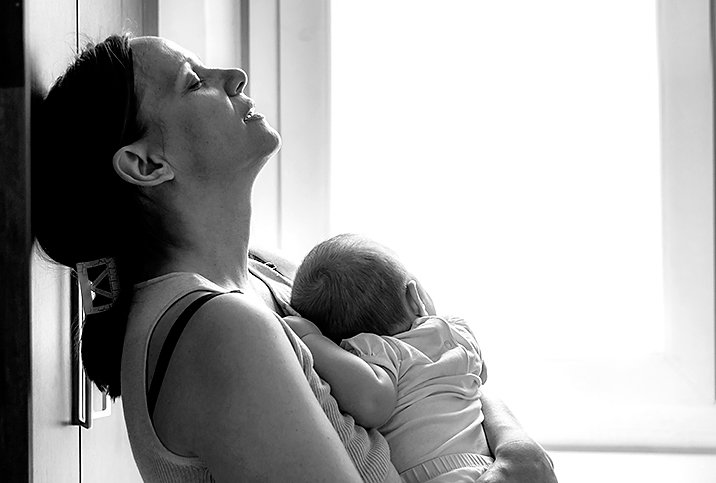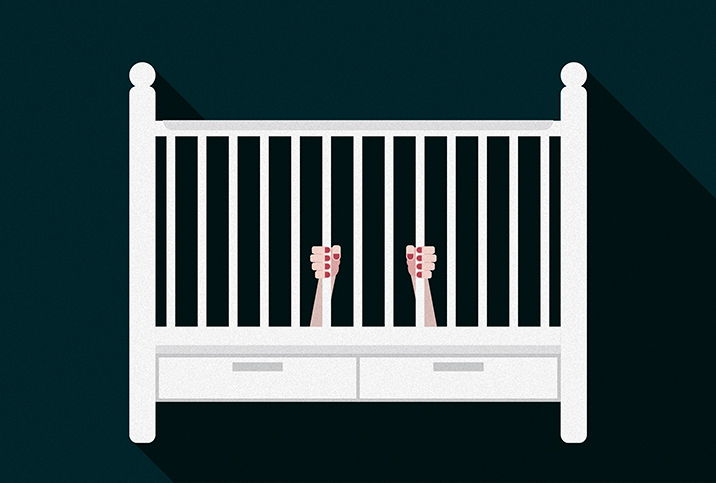Kylie Jenner Talks Navigating Postpartum Depression

Five years ago, on a hospital bed in Los Angeles, an exhausted Kylie Jenner met her newborn daughter, Stormi.
It was one of the exciting moments of becoming a mother, "finding myself in the hospital alone with a new and unknown creature in my arms," Jenner said in an interview with the Italian Vanity Fair published Feb. 22.
"There is another magical moment, though: when you bring your children home," said the reality TV star, who also runs a multimillion-dollar beauty brand. "It is perhaps the most beautiful moment."
But motherhood hasn't been all beautiful moments, Jenner confessed. Following the birth of Stormi—as well as her second child, a son named Aire—she struggled with postpartum depression.
"The first time was very difficult, the second was more manageable," said Jenner, who shares her kids with former partner Travis Scott.
When pressed for advice to mothers who are facing similar mental health issues, Jenner said, "I would tell those women not to overthink things and to live all the emotions of that moment to the fullest. Stay inside that moment, even if it is painful.
"I know, in those moments you think that it will never pass, that your body will never be the same as before, that you will never be the same," she continued in the interview. "That's not true. The hormones, the emotions at that stage are much, much more powerful and bigger than you. My advice is to live through that transition, without fear of the aftermath. The risk is to miss all the most beautiful things of motherhood as well."
About postpartum depression
Postpartum depression is a mental health condition characterized by intense sadness and despair that occurs after childbirth. The Centers for Disease Control and Prevention (CDC) estimates that 1 in 8 women experience postpartum depression.
Common symptoms of postpartum depression include sadness, worthlessness or shame, anxiety, poor concentration, sleep and eating disturbances, and thoughts of hurting the baby or themselves, said Kecia Gaither, M.D., board-certified in OB-GYN and maternal-fetal medicine and director of perinatal services/maternal-fetal medicine at NYC Health + Hospitals/Lincoln in the Bronx in New York City.
"The cause of postpartum depression is unknown," Gaither explained. "Risk factors include a prior or family history of postpartum depression, complications during childbirth, underlying psychiatric conditions and lack of support."
Postpartum depression is a type of perinatal depression, or depression that happens during pregnancy or in the first year after giving birth.
Postpartum depression vs. 'baby blues'
Postpartum depression is different from the "baby blues," or the mood swings, crying spells and anxiety experienced by most moms after childbirth. The baby blues usually appear within days of giving birth and last up to two weeks after delivery.
Postpartum depression is comparatively more severe and long-lasting, Gaither explained.
"It's typically characterized clinically by depressive symptoms that occur within two weeks post-birth," she said. "Postpartum depression lasts a varied length of time; it may be weeks, months or longer if untreated."
Gaither said untreated postpartum depression could lead to postpartum psychosis, a rare medical emergency that causes hallucinations, confusion, paranoia and rapid mood swings.
Postpartum depression treatment and prevention
How postpartum depression is treated depends on the severity, Gaither said. Treatment can include antidepressants, such as selective serotonin reuptake inhibitors (SSRIs), therapy, support groups and relaxation techniques.
To minimize the risk of experiencing postpartum depression, Gaither recommended prioritizing postpartum health.
"Preventative measures that may be of use include rest, exercise and stress reduction techniques," she said.
A support system is key, Gaither emphasized. If you are experiencing the symptoms of postpartum depression, reach out to a partner, friend or family member for help, and seek treatment from a medical provider or mental health professional. Remember that depression is treatable with the appropriate diagnosis and care.


















